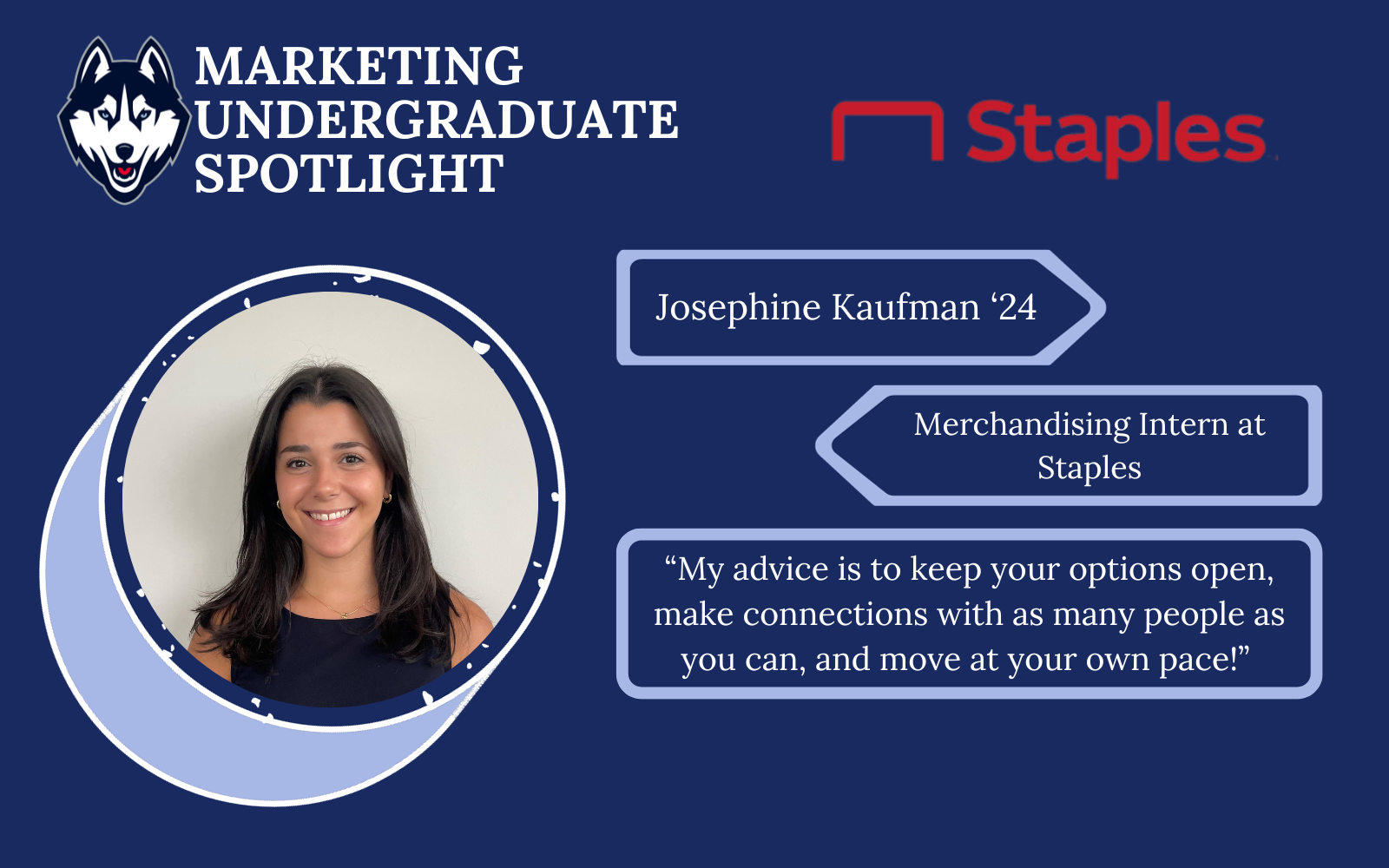CT Insider – STAMFORD — WWE founder Vince McMahon has stepped down from the company, in the wake of a lawsuit filed last week by a former employee who accused him of sexual abuse. If that scenario sounds familiar, it is because McMahon announced his retirement a year-and-a-half ago amid a company investigation into alleged misconduct.
Marketing
Five Alumni to be Inducted into UConn School of Business Hall of Fame
UConn Today – Five UConn School of Business alumni, who have excelled in fields as diverse as college basketball, power-tool manufacturing, and complex financial services, will be inducted into the School of Business Hall of Fame this spring.
Ask the Experts: LendingClub Review
Wallethub –
Q: What are some pieces of advice people should follow when comparing personal loan offers from different lenders?
A: One of the most important criteria is the loan’s interest rate. The higher the interest rate, the more expensive the loan is for the borrower. Borrowers should consider whether the loan has a fixed rate or variable rate.
Student Spotlight: Adrianna Empaynado

Adrianna Empaynado is a Marketing major and Communications minor graduating in May 2025. During Adrianna’s undergraduate career she quickly grasped the importance of networking, noting “Every conversation you have is possible a connection”. Adrianna was highly involved in the Business Connections Learning Community during her first two years at UConn, as well as Women in Business and now serves on the Executive Board of the student-led organization. “Both of these organizations motivated me to start my career search early, explore my passions, and grow my network.”, She shares.
Adrianna currently works as a Marketing and Communications Intern for Steel Sports. While she has been in this role since June 2023, she had worked for the company for three years prior. “I was familiar with the company, their values, and the staff. I didn’t experience a normal interview process with Steel Sports due to the networking I had done previously while working my summer job. My boss recommended me for the internship and I was quickly directed to HR and onboarding.”, Adrianna recalls.
Adrianna’s responsibilities include managing the Steel Sports Instagram and Facebook accounts though posting, making graphics on Canva, and working on branding strategy. She has weekly meetings with her boss, Nathan, to stay on task as well as the branding team to brainstorm social media campaigns and other branding techniques. However, Adrianna’s tasks highly depend on the sports season, camp schedules, and tournaments that Steel is a part of.
Adrianna’s favorite professional experience so far has been connecting with professionals at Island Records. “My dream is to work in entertainment, but more specifically the music industry. I was able to connect with SVPs this summer in New York. Meeting with them one on one was an amazing experience that offered so much insight into the industry. It was really eye opening and definitely confirmed that music is the industry I want to be involved in.”, She shares.
Adrianna’s greatest advice is to keep your options open and never stop networking: “You never know where your next opportunity will come from. I never thought about going into the sports industry, but the company I ended up interning for was right in front of me for years. I kept my options open and I gained great foundational experience that is very applicable to my other roles and future opportunities. Keep an open mind and connect whenever possible!”
Student Spotlight: Nathan Miller

Nathan Miller is a current Senior graduating May 2024 with a double major in Marketing and an Individualized Major of Humane Technology Design. In order to prepare himself for the professional world, Nathan “made sure to stand out on paper”. Nathan took advantage of his first few semesters at UConn being online and started to develop his resume with various professional experiences. He started small, doing some branding and design work at a local historical society, joining campus organizations, and building an online portfolio.
“I made sure that I wasn’t just joining organizations or doing things to look good but contributing to my interests and growth in a meaningful way,” Nathan recalls.
This past summer, Nathan completed a ten-week Experience Design Internship with Travelers Insurance. During this time, Nathan was able to work with people both internal and external to Travelers; as an intern under an operations manager, he learned all about how design and marketing fits into Travelers’ different business units. Nathan’s days would vary between working on research/design projects, setting up meetings and benchmark evaluations, and sometimes even attending intern-oriented events that Travelers hosted. He even got to spend a whole week at the PGA tour for the marketing team!
“I met so many amazing people during my time at Travelers and learned a lot about corporate operations and culture,” he says.
Nathan’s favorite experience from his internship was being given the opportunity to participate in Travelers’ internal hackathon, InJam.
“This was a spur-of-the-moment project that I developed after a sidebar conversation about AI in a team meeting,” Nathan explains, “For the hackathon, I prototyped an AI-powered web browser tool that would allow users to more easily navigate “terms and conditions” pages for digital products and services. Both the purpose of this project and the nature of its development made it one of the best parts of my internship”.
Nathan originally had applied for a generic marketing position at Travelers but was placed into a more specialized role that aligned more closely with his skills and background in design. Nathan looks back on the Traveler’s interview experience positively, stating “My interview was the shortest I had experienced all season; I felt the hiring manager and I had a strong connection that made us both feel comfortable and ready for more conversation. I received a call back within 24 hours, and accepted the position!”
This experience was vastly different from his application process, which Nathan described as “arduous” and “frustrating”. To other undergraduate students going through this stressful process, Nathan offers the following advice:
1. Don’t mindlessly apply: I applied to maybe one hundred internships last season, and a lot of my applications would consist of sending in a briefly tailored resume and a template-based cover letter. Not only was this a poor reflection of my capabilities as a potential employee, but also the constant stream of rejections I faced was demoralizing. I would suggest applying to each job like it is your dream company–strive to stand out. I’m not referring to the rhetoric you use in your cover letters and resume bullets, but rather the strategies you use to gain connections within your target company. Take advantage of your alumni network, become a LinkedIn personality, and get creative with how you can differentiate yourself!
2. Start early: Get all of your documents and interview preparation ready as soon as possible. Internship applications are opening all the time, both before and after the seasonal surge. Start researching companies on LinkedIn, Reddit, etc. Practice your interviews with Google’s Interview Prep Tool. Have your resume looked over by a writing center resource, your professors or your advisor.
3. Keep learning: If you feel like you aren’t where you would like to be in terms of career competitiveness, there are many resources which can help advance your position. I love keeping up with the School of Business’s events, attending career fairs, and following career-oriented professionals on social media (particularly TikTok). By subscribing to newsletters and signing up for opportunities, you open yourself up to networking and learning potential that can help you get one step closer to a position!
Student Spotlight: Josephine Kaufman

Josephine Kaufman, a Marketing major with a concentration in Digital Marketing and Analytics, is set to graduate in December 2024. Josephine’s academic journey reflects her commitment to success. She actively engages in her courses by asking questions in class and completing assignments thoughtfully. She approaches her coursework as if they were real-life job assignments, enabling her to think more critically and understand the relevance of her studies in the business world. This dedication to her studies helped her develop a strong foundation for her professional career. Josephine also works as a Teaching Assistant for BUSN 3005 and is an Administrative Assistant at UConn Rec.
This past summer break, Josephine secured a Merchandising Internship at the Staples Headquarters in Framingham, MA. When she first began applying to internships, the role at Staples stuck out to her because it would allow her to demonstrate her knowledge from her courses at UConn. She applied via the Staples website and was invited to a phone interview with a recruiter, and then a Zoom interview with her future manager.
“The questions were based on the job qualifications, and I was very pleased that my coursework and previous job opportunities had provided me with experience to discuss in the interview,” Josephine recalls, “When I was offered the role, I was very excited since I connected with my manager and was very confident in my responses to their questions”.
A typical day in her internship involves a diverse range of tasks. At the start of the week, Josephine updates financial reports using tools like Excel and PowerBI to reflect sales volume from the previous week. She then forwards these reports, along with a summary of the data’s insights, to various team members. She also took part in daily meetings with different departments, including Pricing, Marketing (creative), Inventory, Promotions, Planogram (store layout), and more to make sure that all parts of the business are on the same page.
Her favorite professional experience during the internship was the opportunity to present her internship work to her team, fellow interns, and C-Suite members at Staples. During her presentation, Josephine was able to reflect on how she discovered her passion for working with data. “I enjoyed Merchandising because it emphasized collaboration with many different departments and teams across the company,” she states, even though she initially expected to be more drawn to creative and digital marketing work.
For undergraduate students seeking internships or full-time roles, Josephine offers: “My advice is to keep your options open, make connections with as many people as you can, and move at your own pace!”
Dean Elliott’s ‘Alumni Town Hall’ to Address the Changing Role of Business Education
UConn Today – If you graduated from the School of Business a decade or more ago, you probably wouldn’t recognize some of the curriculum today.
“Our students are exploring newer areas of study, including entrepreneurship, data analytics, and financial technology, as they prepare to enter a rapidly changing workforce,’’ said Dean John A. Elliott. “This is a remarkable and exciting time at the School of Business and I’m eager to talk about what has changed and why.’’
Voya Colloquium explores Consumer Financial Decision Making

The Marketing Department at the UConn School of Business hosted its 11th annual Voya Financial Colloquium on the topic of “Consumer Financial Decision Making.” The event, held on Oct 13th, 2023, brought together researchers from across the country to discuss how consumers respond to a changing financial landscape, the challenges they face in navigating financial systems and how their interactions within a broader social context influence their financial decisions.
“The study of consumer financial decision making explores how consumers accumulate and use financial resources over time and is a fast-growing area of research within the field of marketing,” said UConn Marketing professor Christina Kan in opening remarks.
Professor Kan, who organized the event, went on to discuss how financial decision making is also of interest to many other disciplines, noting “Our goal for this colloquium was to look at the topic of consumer financial decision making from a variety of different perspectives, and we’re delighted to have a panel of speakers from diverse backgrounds.”
The colloquium featured four distinguished speakers – Professors John Lynch, Rafael Becerril Arreola, Rebecca Hamilton, and Robert Lawless – each of whom approached the topic from different perspectives – including marketing and law – as well as different methodologies – including experimental, econometric, and ethnographic approaches.
The colloquium fostered an energetic discourse between speakers and participants, including marketing and law faculty and doctoral students from UConn, UMass and URI.
Below are profiles of the guest speakers and an abstract of their presentations:
John Lynch, Distinguished Professor at the University of Colorado-Boulder, delved into the complex relationship between financial knowledge, financial behavior, and financial well-being. Lynch highlighted two prevalent approaches to improving consumer financial well-being: financial education and behavioral interventions, often referred to as “nudging.” He introduced the concept of “just in time” financial education, positioning it between these two approaches.
Lynch used these concepts as a springboard for discussion on his recent research into a pressing issue – employees cashing out their 401(k) retirement savings when changing jobs. In a comprehensive study covering 162,360 terminating employees, Lynch and his coauthors found that over 40% of individuals leaked their 401(k) savings, cashing out at job separation, with employer contribution proportions influencing the likelihood of leakage. The findings underscored the unintended consequences of well-intentioned employer matches, revealing the delicate balance between supporting employees and inadvertently encouraging financial decisions that undermine long-term well-being.
Rafael Becerril Arreola, Associate Professor at the University of South Carolina, focused on the impact of product price rankings on consumer choice. His research addressed Veblen effects and counter-effects, investigating how product prices signal consumer wealth. Using a quasi-experimental approach, Becerril Arreola’s approach addresses potential identification threats. His analysis capitalized on a rich dataset on automobile rentals to demonstrate that consumer sensitivity to local rankings of selling-prices is highly heterogeneous, often negative, and comparable in magnitude to consumer sensitivity to rental fees. The study highlights the role that prices play in wealth signaling effects and suggests that conspicuous consumption may be more significant than previously estimated.
Rebecca Hamilton, the Michael G. and Robin Psaros Chair in Business Administration at Georgetown University, explored the challenges families face in responding to resource scarcity. Drawing on in-depth interviews with 30 diverse families, Hamilton developed a framework illustrating how multi-dimensional, concurrent and/or consecutive life events (such as job changes, house moves or child birth) create mismatches between available and required resources, triggering situational resource scarcity. The study identified various patterns of adjustments in consumption and resource investment over time, and how they are influenced by families’ chronic resource constraints and availability of support networks. Hamilton notes that that the flexibility afforded by multiple family members is constrained by collective goals, domains of control, tensions, and negotiations within families.
Robert Lawless, the Max L. Rowe Professor of Law at the University of Illinois, provided a thought-provoking presentation on the bankruptcy system and the experiences of individuals navigating financial distress. Using data from the Consumer Bankruptcy Project, a long-running study of persons who file bankruptcy, Lawless highlighted the prevalence of personal bankruptcy in the U.S., noting that roughly one in ten Americans have filed bankruptcy at some point during their lives. His presentation focused on two themes. The first centered around the legal and economic consequences of filing bankruptcy and how legal services are marketed just like everything else. The second theme illustrated life in the “sweatbox,” shedding light on the financial precarity and distress that individuals endure in the years leading up to bankruptcy filing.
Ask the Experts – Insurance Review
WalletHub – Q; Do you think Liberty Mutual’s tagline about customizing insurance to customers’ needs really distinguishes it from other insurance companies?
A: The “only pay for what you need” campaign is supported by several humorous vignettes with established characters, building familiarity and trust. The storylines are attention-getting, memorable, and pleasant. This is the strength of this campaign.
Marketing Students Played a Pivotal Role in Creating a Safer UConn
UConn Today – Capt. Justin Gilbert believed the new LiveSafe app offered by the UConn Police Department could be a potential lifesaver for students—if only they knew about it.
But after a semester of availability, the app had only 400 active users.
“We weren’t getting much traction,’’ Gilbert says. “And that was really frustrating because this app has really great safety features.’’